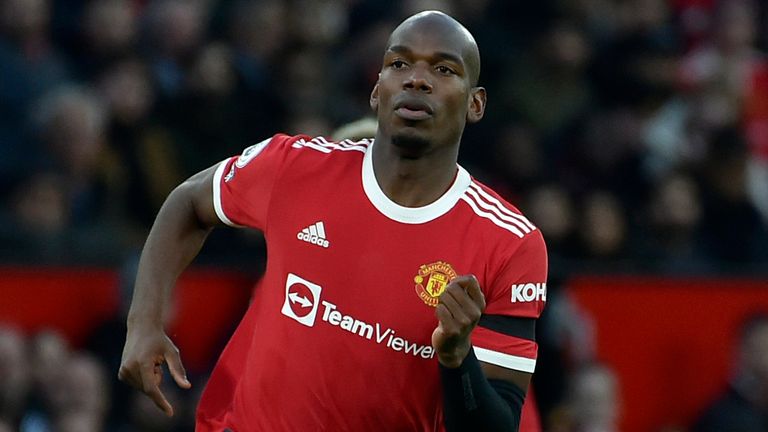Paul Pogba: Man Utd midfielder speaks about his experiences of depression and says mental health of footballers must be discussed more
"In football it is not acceptable but we are not superheroes, we are only human beings," says Paul Pogba, as he tells French newspaper Le Figaro about his own experiences with depression; Man Utd midfielder says there should be a more open discussion about the mental health of footballers
Wednesday 23 March 2022 13:54, UK
Paul Pogba has opened up about experiencing depression "several times" during his career.
The Manchester United midfielder believes it is difficult for footballers to speak out about their mental health struggles.
He adds high salaries are no barrier and the constant scrutiny players are under creates an intense environment they have to deal with.
"Completely, and several times during my career," replied Pogba, when asked if he had experienced depression in an interview with French newspaper Le Figaro.
"I have been through it, but we don't talk about it. Sometimes you don't even know you have depression, you just want to be isolated, to be all alone, these are the unmistakable signs.
"From a personal perspective, that started when I was with Jose Mourinho at Manchester.
"You ask yourself if there is something wrong with you, because you have never experienced these moments in your life.
"Of course we earn a lot of money and we don't complain, really. But that does not prevent you from going through these moments in your life - like the whole world - which are more difficult than others.
"In football it is not acceptable but we are not superheroes, we are only human beings."
Pogba used the fallout from Kylian Mbappe's penalty shootout miss for France during Euro 2020 as an example of how players' mental health can be overlooked and backed Thierry Henry's recent call for there to be more discussion about mental health of footballers.
"I agree entirely with Titi [Henry]," said Pogba. "Football is the most individual of team sports.
"One is judged every three days, we have to be good all the time, although we have worries like everyone, whether that's with our partners, our coach, in everyday life.
"Of course you will feel it in your body, in your head, and you can have a month, even a year, when you are not great. But you can't say it - publicly anyway.
"Everything is inside your head, the mind controls everything and all top athletes go through these moments, but very few talk about it.
"Kylian, when he missed his penalty against Switzerland, nobody thought about him afterwards even though he received tonnes of criticism and awful things [were] said about him.
"If you are not shielded mentally, you are dead in this sport. These tests will be the making of you, but you must not let your guard down."
- Man Utd hold 'positive' talks with Ajax boss Ten Hag
- Rangnick's Man Utd role not clear | Poch, Ten Hag lead shortlist
Pogba says he confides in former Manchester United and France team-mate Patrice Evra, his wife, or his son during difficult times.
"I don't want it to be the case that these negative moments make me forget all my achievements," he said.
"But it isn't necessarily easy and when I can't manage by myself, I talk a lot with Tonton Pat [Evra] - former players who have experienced it, because they will understand immediately.
"My psychiatrist can be my best friend, my wife or my son. To speak, to be listened to, to get out all of this rage and this depression that is gnawing at you is obligatory for me."
Pogba also revealed his 2018 World Cup winner's medal was among the items stolen during a recent burglary at his home.
The incident occurred last Tuesday while he was playing in United's Champions League match against Atletico Madrid and with his children asleep in their bedroom in the care of a nanny.
"There were jewels from my mother, my world champion medal," Pogba said of the items taken.
"What scared me the most was that my two children were at home with the nanny during this incident.
"She overheard everything, called my wife and security, then locked herself with the boys in a room. For several days, she was shocked. The main thing is that my children are well."
In the UK and Ireland, Samaritans can be contacted on 116 123 or email jo@samaritans.org or jo@samaritans.ie


